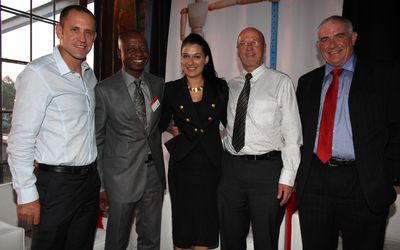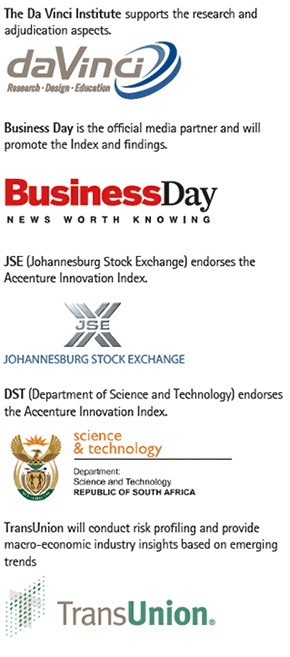INNOVATION has become a buzz word, like “synergies” and “partnerships” — it sounds exciting, but is often short on substance. What does innovation entail? Why should companies innovate? These are questions that the Accenture Innovation Index, launched last month, is trying to address.
It will be the first attempt in this country to measure private and public sector innovation.
Innovation is seen as a way for companies to increase their competitiveness and as a conduit for job creation, but there has been no metric in South Africa for measuring it.
While innovation is often viewed as research and development (R&D), it can also be organisational innovation, and a way of doing things differently.
Innovation is “new ways of doing things that add value … and it can only add value if it is implemented or put into commercial use”, says William Mzimba, CEO of management consulting, technology services and outsourcing company Accenture in South Africa.
There have been numerous studies linking economic development with R&D, but the main contributor to R&D — the private sector — has been reducing its spend.
R&D is a key driver of economic growth, competitiveness and job creation, and is the foundation for a knowledge economy. Despite the goal of increasing R&D expenditure as a percentage of gross domestic product (GDP) to 1% in 2008, expenditure continues to fall short, according to the Department of Science and Technology.
South Africa spends 0.92% of its $408.24bn GDP on research and development, which is less than developed countries and its emerging-market partners.
Brazil, Russia and China spend more than 1% of their GDPs on research and development, according to World Bank indicators, and their GDPs are considerably higher.
At the launch of the index last month, JSE director Geoff Rothschild announced the stock exchange’s support for the index, saying “innovation is critical to the future of our country and we want to be part of the solution”.
Says Mr Mzimba: “We wanted to create an index that would constitute or encapsulate what innovation is all about. We will be looking at a number of things we believe are important in (incubating) innovation. It can give South Africa a view of what should be done to spur innovation in the country.”
The aim of the index is not just about recognising the achievement of companies that innovate, says the Da Vinci Institute’s Roy Marcus.
“We want to try to get behind what is going on inside South African organisations. South Africa is innovative — this innovation index is about getting to the nitty-gritty, getting to the key lessons you can extract from these entities and creating a positive learning spiral to spur growth and job creation,” he says.
Mr Mzimba says the index will create “a body of knowledge that is available, that people can have access to. How did company x, y and z achieve that? A body of knowledge that offers insights into what company leaders are doing.”
On the one hand, the index aims to highlight and recognise the work of innovative companies, giving them the prestige and recognition that is often lacking in South Africa.
But it is also about creating a blueprint for innovation, and helping aspiring companies see where they could innovate further.
Science and Technology Minister Derek Hanekom, who was at the launch of the index, said innovation was “pushing the boundaries of possibilities, (and) not just doing new things, but new and better ways of doing things”.
Earlier this month, the index — a partnership between Accenture, the Da Vinci Institute, TransUnion and Business Day — opened a call for entries, and encouraged all South African companies to enter.
Mr Mzimba emphasised Accenture’s commitment to the initiative by saying: “We are investing a substantial amount of money, because we believe it is important to create a national index for a better South Africa.”
The first step for companies is to register online. Once accepted, they have to fill out a questionnaire. Even if companies do not make the shortlist, they will still get feedback.
“We spent months designing this questionnaire … it’s not just a thumb suck,” says Mr Marcus, noting that it could show companies areas in which they could innovate or areas where they could measure performance.
“Every organisation that enters gets a performance dashboard. You will be shown where you sit relative to your peers. From an academic point of view, it gives us firmer ground as to what innovation is all about.”
Many people cite the environment and the government’s regulatory framework as impediments to innovation, but Discovery Vitality CEO Gidon Novick says that these are just excuses. “You’ve got to work with what you’ve got. Something that inhibits innovation is excuses. You can’t just blame the government,” he says.
At the same time, Mr Marcus says that “South Africa has nothing to be afraid of. People must go back to their organisations and encourage them to join the index.
South Africans are more recognised internationally than locally, and we need to stimulate people to become more innovative.”
The index will identify five major industry groupings, says Mr Mzimba. But he emphasises that “the important thing is that this is not just an award. It is not just a gala dinner.
It is accompanied by in-depth research about the value of innovation, and how companies should go about innovation.
“It will give a blueprint for companies to understand how to deliver innovation and (imbed) an innovative system in their companies.”
The gala dinner announcing the top performing companies is in August.
Insights: Accenture Innovation Index

Panellists at the Accenture Innovation Index launch event were, from left: Discovery Vitality CEO Gidon Novick, Accenture CEO William Mzimba, Eleni Giokos (moderator), Science
and Technology Minister Derek Hanekom and Professor Roy Marcus, chairman of the Da Vinci Institute. Picture JEREMY GLYNN
INNOVATION has become a buzz word, like “synergies” and “partnerships” — it sounds exciting, but is often short on substance. What does innovation entail? Why should companies innovate? These are questions that the Accenture Innovation Index, launched last month, is trying to address.
It will be the first attempt in this country to measure private and public sector innovation.
Innovation is seen as a way for companies to increase their competitiveness and as a conduit for job creation, but there has been no metric in South Africa for measuring it.
While innovation is often viewed as research and development (R&D), it can also be organisational innovation, and a way of doing things differently.
Innovation is “new ways of doing things that add value … and it can only add value if it is implemented or put into commercial use”, says William Mzimba, CEO of management consulting, technology services and outsourcing company Accenture in South Africa.
There have been numerous studies linking economic development with R&D, but the main contributor to R&D — the private sector — has been reducing its spend.
R&D is a key driver of economic growth, competitiveness and job creation, and is the foundation for a knowledge economy. Despite the goal of increasing R&D expenditure as a percentage of gross domestic product (GDP) to 1% in 2008, expenditure continues to fall short, according to the Department of Science and Technology.
South Africa spends 0.92% of its $408.24bn GDP on research and development, which is less than developed countries and its emerging-market partners.
Brazil, Russia and China spend more than 1% of their GDPs on research and development, according to World Bank indicators, and their GDPs are considerably higher.
At the launch of the index last month, JSE director Geoff Rothschild announced the stock exchange’s support for the index, saying “innovation is critical to the future of our country and we want to be part of the solution”.
Says Mr Mzimba: “We wanted to create an index that would constitute or encapsulate what innovation is all about. We will be looking at a number of things we believe are important in (incubating) innovation. It can give South Africa a view of what should be done to spur innovation in the country.”
The aim of the index is not just about recognising the achievement of companies that innovate, says the Da Vinci Institute’s Roy Marcus.
“We want to try to get behind what is going on inside South African organisations. South Africa is innovative — this innovation index is about getting to the nitty-gritty, getting to the key lessons you can extract from these entities and creating a positive learning spiral to spur growth and job creation,” he says.
Mr Mzimba says the index will create “a body of knowledge that is available, that people can have access to. How did company x, y and z achieve that? A body of knowledge that offers insights into what company leaders are doing.”
On the one hand, the index aims to highlight and recognise the work of innovative companies, giving them the prestige and recognition that is often lacking in South Africa.
But it is also about creating a blueprint for innovation, and helping aspiring companies see where they could innovate further.
Science and Technology Minister Derek Hanekom, who was at the launch of the index, said innovation was “pushing the boundaries of possibilities, (and) not just doing new things, but new and better ways of doing things”.
Earlier this month, the index — a partnership between Accenture, the Da Vinci Institute, TransUnion and Business Day — opened a call for entries, and encouraged all South African companies to enter.
Mr Mzimba emphasised Accenture’s commitment to the initiative by saying: “We are investing a substantial amount of money, because we believe it is important to create a national index for a better South Africa.”
The first step for companies is to register online. Once accepted, they have to fill out a questionnaire. Even if companies do not make the shortlist, they will still get feedback.
“We spent months designing this questionnaire … it’s not just a thumb suck,” says Mr Marcus, noting that it could show companies areas in which they could innovate or areas where they could measure performance.
“Every organisation that enters gets a performance dashboard. You will be shown where you sit relative to your peers. From an academic point of view, it gives us firmer ground as to what innovation is all about.”
Many people cite the environment and the government’s regulatory framework as impediments to innovation, but Discovery Vitality CEO Gidon Novick says that these are just excuses. “You’ve got to work with what you’ve got. Something that inhibits innovation is excuses. You can’t just blame the government,” he says.
At the same time, Mr Marcus says that “South Africa has nothing to be afraid of. People must go back to their organisations and encourage them to join the index.
South Africans are more recognised internationally than locally, and we need to stimulate people to become more innovative.”
The index will identify five major industry groupings, says Mr Mzimba. But he emphasises that “the important thing is that this is not just an award. It is not just a gala dinner.
It is accompanied by in-depth research about the value of innovation, and how companies should go about innovation.
“It will give a blueprint for companies to understand how to deliver innovation and (imbed) an innovative system in their companies.”
The gala dinner announcing the top performing companies is in August.
Insights: Accenture Innovation Index






















Change: -1.52%
Change: -1.70%
Change: -1.84%
Change: -1.60%
Change: -1.52%
Data supplied by Profile Data
Change: -0.64%
Change: 0.12%
Change: -1.52%
Change: 0.00%
Change: 0.10%
Data supplied by Profile Data
Change: 0.73%
Change: -0.11%
Change: 0.63%
Change: 1.18%
Change: 1.40%
Data supplied by Profile Data
Change: 0.72%
Change: 0.71%
Change: -0.13%
Change: 0.33%
Change: -0.15%
Data supplied by Profile Data